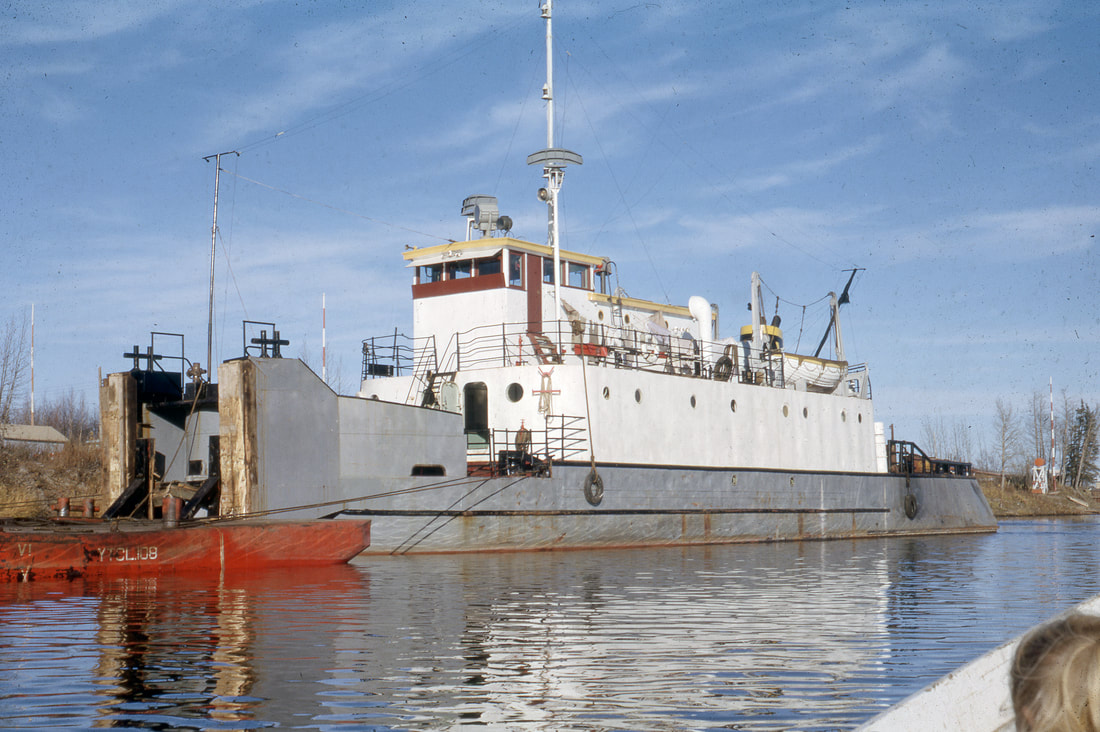|
Many people have asked why we created A Métis Man's Dream; From Traplines to Tugboats in Canada's North. This book, about a poor Metis boy's growth from his Iroquois Cree grandfather's trapline to success in marine transport and crane services, despite all the odds, came about for a number of reasons. However, the most significant to me is the need to save Gordon's personal story in the context of its place among the tugs and barges that moved one of the largest economic booms Canada has ever seen. To this extent, a major driver was completely altruistic. That was the sense that Metis and marine transportation history in the north, particularly in Hay River and along the Mackenzie River and out into the Arctic, was (and is) being lost for all time. Even now, the stories seem to have faded like the aft lights on a group of barges being towed into the morning mist of Great Slave Lake.
The secondary aspect was that surprisingly, so few people in Canada even know there is history in the area. In my book signings, I am repeatedly reminded about the number of people who had no idea how goods and people moved about the NWT, or even that there was a marine industry (and exploration, oil and gas, mining, etc) in the NWT. "Tugboats? in the North? Where? Why?" was a common refrain. Few remember that Edmonton (for example) was a part of the Hudson Bay Empire from 1670 and then from 1870 to 1905, a part of the Northwest Territories, and that transportation even then was the basis for all life in the north. So, this is a work of oral history, of Gordon Gill and his Métis upbringing, but it is more than that too. It is a history of the north, of transportation and business and resilience. What started as a random comment about residential schools in the NWT led to ongoing conversations with Gordon Gill, the Metis Man with the dream, and about the history of the South Mackenzie, as that area of the Northwest Territories cornered by the Alberta and Yukon borders is called. It is also a story I have wanted to tell since first venturing forth as a callow 18 year old university student to work for the Northern Transportation Company Ltd. (NTCL) in Bell Rock camp, where the company was having the new era of large tug boats built for the northern trade and the upcoming oil and gas boom during the Pan-arctic and Dome Petroleum years. The dream for Gordon, as he initially told it, was simply to be a mechanic and welder. He wanted to get out of Hotchkiss, in the north Peace because there was nothing there for him as a Métis boy with no trade, no future. Later, his dream expanded as Gordon went about his life, first to be able to supply food and security for his family, in the mode of Lionel Gagnier, his uncle by marriage. (Lionel Gagnier is a legend in the north and likely worthy of his own story). But then, as Gordon achieved more and more, first as a ship's engineer on the Mackenzie River and the Arctic Ocean, then as a repairer of damaged ships and tugs at the Hay River base of Northern Transportation Company Limited, he thought he could do more. He liked to work, and he always gave more than was expected of him. He mentored others, hiring and training welders and such. Then he got the opportunity to set up his own business, with the generous help of John Pope and others. Gordon always talks of others who helped him. There is another aspect of the story: Why do some get help and others not? I suspect Gordon's own helpfulness, his eagerness to do more than his share, his gentle demeanour, and his appreciation made a lot of the difference. He was also willing to take risks (like setting up a business) and later, to create a new company and move it to where the work was. As Gordon says, "If nothing is happening, you need to make it happen" and as the owner and operator of Northern Arc Shipbuilders and ultimately Northern Crane Services, he did that. Gordon also wanted to make sure there was work and opportunity for others. He recognized (and acted on) the fact that many northern employees, at least in the old days, were not so attuned to working by the clock. As northern songwriter Bob Ruzicka wrote, in "The Winds of Change" [LionsGate-BMI], about an Inuit man getting a job: "The man says I got be there on time The man he says I got be there all the time, And he pointed to the clock on the wall. I told him I tell time by the sea and the sun and by the seasons, those are the only reasons for doing the things I might do..." Gordon was not that sort of employer. A Métis Man's Dream hopes to salvage both the personal and the larger elements of a history that has largely passed. Comments are closed.
|
Details
AuthorNeil Gower is a writer living in Edmonton, AB. Archives
July 2024
Categories |

 RSS Feed
RSS Feed
